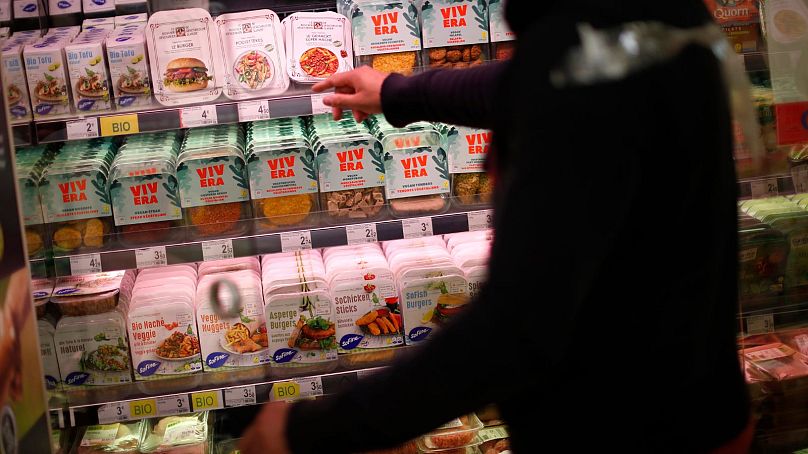As Veganuary celebrates its tenth anniversary, Euronews Culture explores how veganism has re-defined Europe's culinary landscape.
Giving up cheese was the hardest.
 ADVERTISEMENT
ADVERTISEMENT
 ADVERTISEMENT
ADVERTISEMENT
It was an addiction that had me sneaking out to buy slabs of Stilton from a nearby cheesemonger on lunch breaks and eating macaroni cheese every night for three weeks straight. As a work leaving gift, a friend even bought me a necklace with a miniature Dairylea triangle pendant.
I’d decided to go vegan after watching two well-known gateway documentaries: ‘Earthlings’ and ‘Cowspiracy: The Sustainability Secret’. The former is especially shocking, exploring the horrifically cruel treatment of animals across global industries, with a particular focus on factory farming, while the latter navigates the environmental impacts of consuming meat.
It's been a decade since I took that final bite of a Babybel, and in that time veganism has changed dramatically. No longer a source of feeling like an awkward inconvenience, even my local corner shop sells plant-based milks and gelatine-free Fruit Pastilles.
Veganuary, which also celebrates its tenth anniversary this January, has had a lot to do with encouraging such change across Europe - and the world.
What is Veganuary?
In 2014, UK-based businessman Matthew Glover and his partner Jane Land, a former English teacher, founded Veganuary, a yearly January challenge hoping to encourage people to give up - or at least reduce - their consumption of animal products for “a greener planet, lower food bills, better health and kindness to animals.”
The initiative has continued to grow in popularity in recent years, establishing itself as a New Year’s resolution staple alongside the likes of drinking less alcohol or losing weight.
In 2023, more than 700,000 people signed up from across every country in the world, except Vatican City and North Korea, according to a campaign report. Millions more people are also reported to have joined in without signing up.
Its ambassadors include singer-songwriter Billie Eilish, former Beatle Paul McCartney and actor Joaquin Phoenix, who went viral in 2020 for his Best Actor acceptance speech at the Oscars, in which he spoke passionately about animal rights.
The rise of veganism
There was a time, not so long ago, when veganism was considered weird by mainstream Western culture - an eccentricity only hippy aunts that hug trees, burn incense and eat lentils might partake in. The majority of restaurants catered with chips or side salads, while any alternative plant-based products were confined to organic food shops, collecting dust between omega-3 supplements and Himalayan salt Lamps.
The difference today is stark. In most big European cities, you can find vegan produce everywhere; from cafes offering oat milk lattes, to supermarkets with entire aisles dedicated to imitation meat and dairy products. Even fast food chains like McDonalds and KFC have joined in with the addition of plant-based burgers and nuggets to their menus.
“It’s amazing how the presence and acceptance of veganism has grown around the world in the past 10 years and I know Veganuary’s friendly, non-judgemental, just-give-it-a-go-for-a-month-and-see-what-you-think approach has played an instrumental role in this shift,” says Dr Toni Vernelli, International Head of Policy and Communications at Veganuary.
There are an estimated 6.62 million vegans in selected parts of the EU as of 2023, a number that’s forecast to rise to about 8.25 million, according to data gatherers Statista.
Many things have contributed to such an increase, notably: growing concerns around animal welfare, the environment and health, with studies having shown that a plant-based diet could lower body weight, decrease the risk of cancer and even reduce the risk of death from heart disease.
“The positive portrayal in the media has contributed to [veganisms’] changing image,” says Maisie Stedman, a spokesperson for The Vegan Society.
“Documentaries on the shocking realities of animal agriculture have gained prominence; peaceful activists are educating the public about veganism on the streets and in schools; supermarkets and restaurants launch convenient, tasty vegan food options; delicious vegan recipes have multiplied online and on social media as society becomes increasingly health-conscious; and top vegan athletes keep proving that you can be fit and healthy on a plant based diet.”
The internet and social media in particular enabled the super spread of such messages, fostering larger vegan communities and developing a greater demand for dietary and cosmetic alternatives.
This in turn led to an influx of vegan start-ups, including everything from bigger names like California-based companies ‘Beyond Meat’ and ‘Impossible Foods’, to smaller European endeavours such as Switzerland’s ‘Planted Foods’ and French food tech company ‘Umiami’.
Veganuary reports that more than 820 new vegan products were launched in 2023 alone, although these haven’t been without their critics.
Last year, the French government published a decree banning the use of descriptors such as "steak" or "grill" on plant-based products, while Italy's government approved a bill banning the production and use of lab-grown meat.
Some plant-based substitutes have also been classified as ultra-processed foods, leading people to point out that opting for a slice of vegan pepperoni over real pepperoni is no healthier (even if the vegan label makes it easier to lie to ourselves.)
In 2023, there were reports that several UK-based companies like ‘Meatless Farm’ and ‘Oatly’ were struggling to make profits due to a fall in demand, resulting in staff and product cutbacks.
“The market did become oversaturated in some areas. There are only so many vegan sausages and burgers that any market can support, so we’re simply seeing market forces in action,” says Vernelli.
“The cost of living crisis in Britain has also had an impact with more people choosing to buy inexpensive protein sources like lentils, chickpeas, baked beans and tofu instead of pricier plant-based ‘meats’," Vernelli adds.
Where are the most vegans in Europe?
The UK has the most vegans, according to data gathered by World Population Review, but plant-based lifestyles are also at a record high in Germany, where the number of vegans doubled between 2016 to 2020.
"Germany is leading the world in terms of availability and variety of vegan options, as well as business and government commitments to increasing plant-based eating for the environment," says Vernelli.
Other especially vegan-friendly European countries include Austria, Switzerland and Sweden, fuelled by ethical concerns and a general increase in flexitarianism (where people simply reduce the amount of meat and dairy they're eating).
For many other countries where vegan uptake is slower, culture plays a huge part, with meat or dairy-based cuisines intrinsically linked to identity and heritage. In some cases, the promotion of veganism has even received backlash, or caused concern for rural areas reliant on animal agriculture for income.
"The disparities in interest across European countries could be due to a number of factors, including culture, access to plant-based alternatives and the portrayal of media in the press," Stedman explains.
Yet, as another year of Veganuary begins, Vernelli remains optimistic about its continued global rise.
"It will undoubtedly continue to grow around the world as more people, governments and companies accept that our planet cannot support billions of meat-eaters, at least not at our current rates of consumption. The younger generations are already on-board with this idea, and they are the future."




















